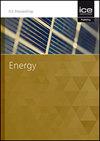世界能源消耗的全球和地方方面:预测和风险
IF 1
4区 工程技术
Q4 ENERGY & FUELS
Proceedings of the Institution of Civil Engineers-Energy
Pub Date : 2022-06-01
DOI:10.1680/jener.21.00105
引用次数: 4
摘要
本研究的目的是在考虑到部门变化和确定可能的偏差限制的情况下,形成对全球长期能源消耗的预测。基于相关分析、自回归模型和聚类分析,对全球和各行业的能源消费总量进行了预测。本研究的科学贡献在于形成了到2050年各区域和部门的能源消耗预测,并辅以聚类。基于已开发的全球能源消费地理分布预测,模拟结果表明,与研究的其他地区相比,欧洲的能源消费略有增加。预计中东地区的能源消费增长最为显著。该研究表明,与前几年成立的国际组织的预测相比,有超过能源消费量的风险。这种聚类显示了国际社会在能源消费方面可能出现的分层,这表明各国的价值观在能源供应和外部环境的可持续性增加方面发生了转移。本文章由计算机程序翻译,如有差异,请以英文原文为准。
Global and local aspects of world energy consumption: forecast and risks
The purpose of this study is to form a forecast of energy consumption at the global level in the long term, taking into account sectoral changes and the identification of possible deviation limits. Projections of total energy consumption at the global level, as well as by sector, were based on correlation analysis, autoregressive modeling, and cluster analysis. The scientific contribution of this study is the formed forecast of energy consumption by regions and sectors until 2050, which is supplemented by clustering. Based on the developed forecasts of global energy consumption with a geographical distribution, the simulated results show that there is a slight increase in energy consumption in Europe compared to the other regions under study. The most significant increase in energy consumption is predicted in the Middle East. The study indicates the risk of exceeding the volume of energy consumption compared to the forecasts of international organizations, which were formed in previous years. The clustering showed the possible stratification of the world community in the context of energy consumption, which signals the migration of values of countries in the context of energy supply and increasing sustainability of the external environment.
求助全文
通过发布文献求助,成功后即可免费获取论文全文。
去求助
来源期刊

Proceedings of the Institution of Civil Engineers-Energy
ENERGY & FUELS-
CiteScore
3.00
自引率
18.20%
发文量
35
期刊介绍:
Energy addresses the challenges of energy engineering in the 21st century. The journal publishes groundbreaking papers on energy provision by leading figures in industry and academia and provides a unique forum for discussion on everything from underground coal gasification to the practical implications of biofuels. The journal is a key resource for engineers and researchers working to meet the challenges of energy engineering. Topics addressed include: development of sustainable energy policy, energy efficiency in buildings, infrastructure and transport systems, renewable energy sources, operation and decommissioning of projects, and energy conservation.
 求助内容:
求助内容: 应助结果提醒方式:
应助结果提醒方式:


